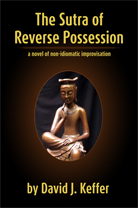The Sutra of Reverse Possession
a novel of non-idiomatic improvisation
by David J. Keffer

Short Description:
“The Sutra of Reverse Possession” is a novel describing the relatively rare occurence of reverse possession,
in which the host maintains the ability to trap spirits (or demons depending upon one's point of view) within himself.
In this case, a man explores a series of spirits, each more powerful than the next, hoping to find one that will give him the strength
to overcome the existential challenges that life presents.
Long Description:
“The Sutra of Reverse Possession” relates the story of a man who seeks to find a way to integrate his roles as husband and father
with his internal struggle with the fundamental issue of meaning and purpose in one’s life.
The father explores possession as a source of strength upon which he can rely to move from one day to the next.
It is an issue of reverse possession because it is the man who invites and imprisons the spirits within himself,
rather than a spirit taking control of the man.
The novel is divided into three parts in which the man sequentially imprisons three spirits,
each drawing their strength from a different source—first violence, then apathy and finally improvisation.
The first spirit, the spirit of violence, is personified as “Earth Traveler Sun”,
a Chinese dwarf who lived during the transition from the Shang to Zhou dynasties circa 1100 B.C.
and whose exploits are recorded in Creation of the Gods (Feng Shén Yanyi),
a novel originally written by unknown Ming dynasty (c. 1368-1644 A.D.) authors.
The second spirit, the spirit of apathy, is personified by “The Unmothered Son”,
the echo of a child who witnessed the massacre of his family in a genocidal act
of tribal retribution and who is damaged beyond all repair because of it.
The third spirit, the spirit of improvisation, is characterized as “the ghost of Charlie Ankleyard”,
the (fictitious) grandfather of non-idiomatic improvisation (loosely based on an amalgamation of the
recently deceased improvisational masters Derek Bailey and Hans Reichel),
for whom improvisation was not just a kind of (unpopular) music but also a way of living.
The story records the impact of each spirit not only on the protagonist, but on his family and friends.
It is only in the last spirit that the man finds a recipe that may indeed provide an acceptable source of the
strength required to fulfill his role as husband, father and human being in general.
The novel is called a sutra because it invokes a variety of religious, both Eastern and Western, themes as it unfolds.
The novel is told with an intentional degree of ambiguity,
so that those readers who are inclined to accept the presence of spirits at face value can do so,
while sufficient evidence is given to explain abrupt changes in the man’s behavior
in terms of psychological and physiological origins for those readers
who prefer scientifically based arguments to supernatural elements in a novel.
length: 124,000 words (360 pages in paperback)
written: December, 2010-May, 2012, Seoul, Korea & Knoxville, Tennessee
paperback size: 6 in x 9 in
paperback publication date: December 10, 2012
paperback ISBN-13: 978-1481039000
paperback ISBN: 1481039008
ebook publication date: December 8, 2012
ebook ISBN-13: 978-1301476701
poison pie publishing house catalog number: PP-010-N
This novel is Book II of The Hortie pentalogy.
buy it in the shop
promotional flyer

